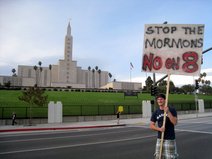| | A gay couple filed a discrimination complaint earlier this month in Denver against a baker who refused to make them a wedding cake because he said it would violate his conscience. Colorado’s law on civil unions does not include any religious protections for businesses. This is similar to a recent case against photographers in New Mexico who were sued for declining to photograph a same-sex marriage. The photographers lost in court. In New Jersey, a judge ruled against a Methodist church that declined to allow a gay marriage on its premises. Three years ago an adjunct professor at the University of Illinois was dismissed after teaching, in a class on Catholicism, why the church believes homosexuality is a sin. He was later reinstated, but not before the chancellor indicated his actions ought to warrant an inquiry. The list goes on and on and is sure to grow longer and faster now. To those who hope for an honest, if passionate, debate on the nation’s public squares about the effects of expanding a time-honored definition of marriage, the Supreme Court’s ruling that the federal Defense of Marriage Act is unconstitutional was a blow. I’m not referring so much to conclusions of the decision as to its wording, which painted those who passed the federal law in the first place as motivated solely by hatred. Never mind that at the time the law was passed no jurisdiction in the country allowed gay marriage, the court’s majority attributed the law’s overwhelming passage and, presumably, the decision by President Bill Clinton to sign it, to “a bare congressional desire to harm a politically unpopular group…” Its “principle purpose is to impose inequality, not for other reasons like governmental efficiency.” And the law “humiliates tens of thousands of children now being raised by same-sex couples.” Forget about any reasoned arguments over government’s interest in marriage as a vehicle for ensuring children have claim to their biological parents or as the best means of providing nurture to children through male and female role models. Forget about how odd it sounds to refer to children in gay households as humiliated when about 40 percent of all children today are born to unmarried parents. With a broad brush, one side of the argument has being marginalized and cast aside by the nation’s highest court. It was this that raised the dander of Justice Scalia. The full quote I alluded to above came after he noted the court’s majority did not even bother to paraphrase the other side of the debate. “I imagine that this is because it is harder to maintain the illusion of the act’s supporters as unhinged members of a wild-eyed lynch mob when one first describes their views as they see them,” he wrote. Democracy is messy; it’s not efficient and it isn’t always fair. But it works best when all sides can be aired under the presumption of best intentions. Then those arguments can be judged on their merits. Or, as Matthew J. Franck of the Witherspoon Institute wrote for the Washington Post a few years ago, “Robust debate is necessarily passionate debate, especially on a question like marriage. But the charge of ‘hate’ is not a contribution to the argument; it’s the recourse of people who would rather not have an argument at all.” Scalia lamented that the Supreme Court fumbled its unique opportunity to change the tenor of the discussion. “In the majority’s telling, this story is black and white: Hate your neighbor or come along with us,” he wrote. “The truth is more complicated. It is hard to admit that one’s political opponents are not monsters, especially in a struggle like this one, and the challenge in the end proves more than today’s court can handle. Too bad.” Too bad, indeed. Churches, businesses and individuals who hold differing opinions ought to be worried. |
|
0 Comments
Your comment will be posted after it is approved.
Leave a Reply. |
Search this siteLike what you read here? Please subscribe below, and we'll let you know when there is a new opinion.
The author
Jay Evensen is the Opinion Editor of the Deseret News. He has more than 40 years experience as a reporter, editor and editorial writer in Oklahoma, New York City, Las Vegas and Salt Lake City. He also has been an adjunct journalism professor at Brigham Young and Weber State universities. Archives
July 2024
Categories
All
Links
|


 RSS Feed
RSS Feed

